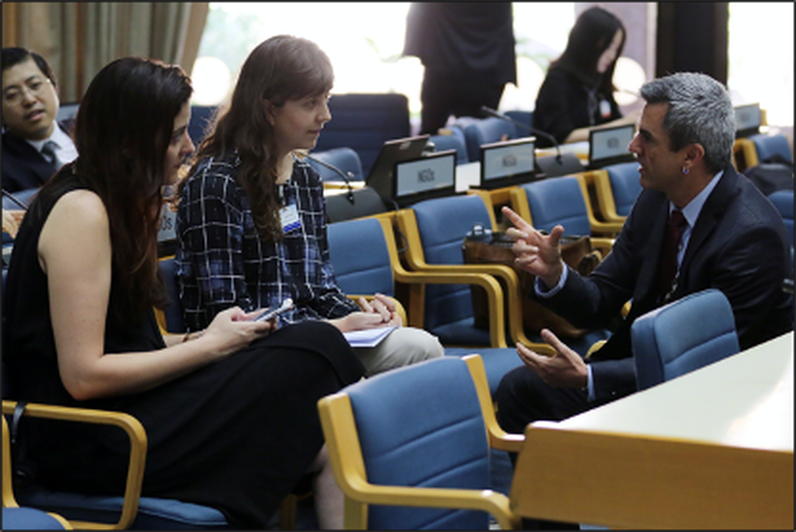Dr Natalie Jones, Research Associate
Natalie works on how global injustice and inequality can potentially contribute to existential risk, with a particular interest in climate change. Her PhD work focused on accountability and procedural justice in global governance.
Her background is in international law and climate policy, including as a Staff Writer for the Earth Negotiations Bulletin at the International Institute for Sustainable Development, a Research Assistant at the Lauterpacht Centre for International Law, and a judges' clerk at the High Court of New Zealand. She holds an LLM in international law from the University of Cambridge, and an LLB(Hons) and BSc in physics from the University of Canterbury.
Keywords: international law, international politics, participation, environmental law, climate change, global justice
Can you tell us about your pathway to CSER?
I studied a double degree in physics and law at undergraduate level, while working as a violinist in a professional orchestra. I was, and still am, one of those people who are interested in everything, and wanted to delay specialising for as long as possible; thinking that a mixture of sciences, humanities and arts would provide a good foundation for learning how the world works in all its aspects. One semester near the end of my degree, I took a course in atmospheric dynamics at the same time as courses on environmental law and indigenous peoples' rights law. It clicked in my brain that not only was climate change a massive problem, but also it inherently required multi-disciplinary solutions and was deeply linked with issues like human rights and land dispossession. Around that same time, a large earthquake devastated my city, which opened my eyes to the ways in which "natural" disasters are magnified by policy responses, and themselves tend to exacerbate existing inequalities -- as well as the potential of grassroots communities and international solidarity. All this was deeply formative.
I subsequently took a circuitous route to research. After university, I went to work as a judges' clerk (research assistant) in the High Court of New Zealand, then a shorter stint working in climate finance at Latin American environmental law NGO, the Interamerican Association for Environmental Defence (AIDA), all while moonlighting as a youth climate activist.
As a youth activist, I was really fortunate to be able to attend the UN climate negotiations in the years leading up to the adoption of the Paris Agreement. This was really eye opening and raised many questions for me. Deciding to further my studies, I came to Cambridge for my LLM and then PhD in international law. At various points during this period, I had the good fortune to work and consult in litigation, climate policy, and (UK and international) politics, including for the Stockholm Environment Institute (SEI), the International Institute for Sustainable Development (IISD) writing for the Earth Negotiations Bulletin, the Urgenda Climate Litigation Network, and as co-coordinator of the All-Party Parliamentary Group for Future Generations. This latter role brought me into touch with scholars at CSER where I was attracted by the interdisciplinary, foundational nature of the work underway at the centre.
Please can you tell us about your main area of expertise?
My expertise is mainly in international law, climate policy, and participatory decision-making. My PhD focused on the question of who is entitled to have a voice in global decision-making processes, mostly looking at intergovernmental organizations, self-determination and the rights of (indigenous) peoples. Alongside my PhD project, I have published on fossil fuel supply side policy and the UN climate regime, the governance of negative emissions, the rights and representation of future generations, waste regulation, and the law governing onshore wind farms, among other topics.
 What is your current research focus at CSER?
What is your current research focus at CSER?
My current work falls into three strands. First, I'm working on a book manuscript which builds on my PhD work. Second, I'm applying this participatory angle to the governance of existential risks: who is being included in policymaking processes, who should be included but isn't, and why not? These factors are important to ensure all relevant information is taken into account, credibility and legitimacy of the resulting policies, and burdens are fairly distributed. Thirdly, I'm working with colleagues to establish the Global Justice stream of CSER's work.
Alongside all this, I am actively exploring research directions for my next major project, which (without saying too much, and jinxing it!) will likely involve the global financial system and law and political economy approaches to studying existential risk. I also have the privilege of getting involved in all the interesting things happening around CSER, from participating in workshops and reading groups to collaborating on papers. There is certainly never a dull moment.
What drew you to your research initially and what parts do you find particularly interesting?
I became interested in understanding whose voices are taken seriously in global decision-making on issues of urgent importance when I was a youth delegate at the UN climate change negotiations (COP 19) in 2013. I saw up close who was included in discussions and who was not, the ways in which this inclusion/exclusion occurred, and how this affected the text. While equity is a well-known, fundamental issue in climate change negotiations—as those that are affected first and worst have historically contributed least to the problem –procedural inequity is less often discussed, but is very real.
How a decision is made has significant effects on what the end result is—not to mention its quality and legitimacy. This is especially important for pressing global risks, where it is considered crucial to get the “right” outcome, i.e. avoid global catastrophe.
What do you think are the key challenges that humanity is currently facing?
Well, it depends who among “humanity” we are talking about. In other words, we need to consider for whom there is an existential or global catastrophic risk. I think many people in the world are, and have long been, facing unnecessary suffering and dire risks in large part due to the actions of a few. The climate and environmental crises are prominent among these risks but certainly not the only ones. We need to tackle these crises at their structural roots, taking into account issues of justice and accountability. This is certainly a critical period of time.
For people who are just getting to grips with Existential Risk, do you have any recommendations for reading?
A good place to start would be Toby Ord’s book The Precipice or Phil Torres’s book Morality, Foresight and Human Flourishing: An Introduction to Existential Risks. From there, you will find all sorts of further reading depending on your specific interests. Specifically on climate and related matters, some books I have also enjoyed recently are A Planet to Win by Kate Aronoff, Alyssa Battistoni, Daniel Aldana Cohen and Thea Riofrancos, The Future Earth by Eric Holthaus, After Geoengineering by Holly Jean Buck, and Our History Is The Future by Nick Estes.
When you're not working at CSER, how do you like to spend your time?
Spending time outside is a huge one for me - and in Cambridge we're fortunate to have lots of green space and countryside for walking and cycling, not to mention the river Cam in which I swim every chance I get. Playing violin, although orchestra and band practice aren't possible at the moment. Reading, widely and voraciously. In lockdown, I picked up gardening and am trying to grow vegetables - "trying" being the operative word!
